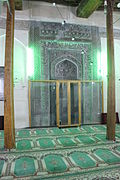Bayazid Bastami
| Bayazid Bastami | |
|---|---|
|
| |
| Born | 804 |
| Died | 874[1] |
| Religion | Islam |
| Region | Western Asia |
| School | Sunni |
Main interests | mysticism, philosophy |
Notable ideas | Shukr |
|
Influences
| |
|
Influenced
| |
Bayazid Bastami (Persian: بايزيد بسطامى; also known as Abu Yazid Bistami or Tayfur Abu Yazid al-Bustami, (804-874 or 877/8[2] CE) was a Persian[3] sufi. He was born in Bastam, Greater Iran.
Background
The name Bastami means "from Bastam". Bayazid's grandfather was a Zoroastrian who converted to Islam.[4] His grandfather had three sons, Adam, Tayfur and 'Ali. All of them were ascetics. Bayazid was born to Tayfur. Not much is known of his childhood, but Bayazid spent most of his time in isolation in his house and the mosque. Although he remained in isolation, he did not isolate himself from the Sufi realm. He welcomed people into his house to discuss Islam. Bayazid also led a life of asceticism and renounced all worldly pleasures in order to be one with Allah The Exalted. Ultimately, this led Bayazid to a state of "self annihilation", which, according to many Sufi orders, is the only state a person could be in order to attain union with God.
Influence
Bastami's predecessor Dhul-Nun al-Misri (d. CE 859) was a murid "initiate" as well.[5] Al-Misri had formulated the doctrine of ma'rifa (gnosis), presenting a system which helped the murid and the sheikh (guide) to communicate. Bayazid Bastami took this a step further and emphasized the importance of religious ecstasy in Islam, referred to in his words as drunkenness (سكر/sukr or wajd), a means of self-annihilation in the Divine Presence of the Creator. Before him, the sufi path was mainly based on piety and obedience and he played a major role in placing the concept of divine love at the core of Sufism.
When Bayazid died he was over seventy years old. Before he died, someone asked him his age. He said: "I am four years old. For seventy years I was veiled. I got rid of my veils only four years ago.”
Bayazid died in 874 CE and is buried either in Bistam. There is also a shrine in Kirikhan, Turkey with the name of Bayazid Bastami(an attribute not real).
Shrine in Chittagong, Bengal (modern Bangladesh)
A Sufi shrine in Chittagong, dating back to 850 AD, is dedicated to the Bayazid.[6] While there is no recorded evidence of his visit to the region, Chittagong was a major port on the southern silk route connecting India, China and the Middle East, and the first Muslims to travel to China may have used the Chittagong-Burma-Sichuan trade route. Chittagong was a center of Sufism and Muslim merchants in the subcontinent since the 9th century, and it is plausible that either Bayazid or his followers visited the port city around the middle of the 9th century.[7]
Gallery
-
Interior of Bayazid's Mosque
-
Dome of Bayazid's Mosque
-
Carving of Bayazid's Mosque
Notes
- ↑ Abdul Karim. "Bayazid Bostami". Banglapedia. Retrieved 2013-02-04.
- ↑ The Darvishes: Or Oriental Spiritualism By John Pair Brown, p. 141
- ↑ Walbridge, John. "Suhrawardi and Illumination" in "The Cambridge Companion to Arabic Philosophy" edited by Peter Adamson, Richard C. Taylor, Cambridge University Press, 2005. pg 206.
- ↑ al-Qushayri, Abu 'l-Qasim; Alexander D. Knysh, translator (2007). Alexander D. Knysh; Muhammad Eissa, ed. Al-Qushayri's Epistle on Sufism : Al-Risala al-qushayriyya fi 'ilm al-tasawwuf (1st ed. ed.). Reading, UK: Garnet Pub. p. 32. ISBN 978-1859641866.
- ↑ al-Qifti, Tarikh al-Hukama' [Leipzig, 1903], 185; al-Shibi, op. cit., 360
- ↑ http://www.newagebd.com/supliment.php?sid=167
- ↑ http://www.banglapedia.org/HT/B_0363.HTM
See also
- Muhammad Muslehuddin Siddiqui
- Timeline of Muslim history
References
- Ritter, H. "Abū Yazīd (Bāyazīd) Tayfūr B. Īsā B. Surūshān al- Bistāmī." Encyclopaedia of Islam, Second Edition. Edited by: P. Bearman, Th. Bianquis, C.E. Bosworth, E. van Donzel and W.P. Heinrichs. Brill, 2009. Brill Online. Augustana. 28 September 2009 http://www.brillonline.nl/subscriber/entry?entry=islam_SIM-0275
- Quasem, Muhammad Abul. "Al-Ghazali's evaluation of Abu Yazid al-Bistami and his disapproval of the mystical concepts of..." Asian Philosophy 3.2 (Oct. 1993): 143. Academic Search Premier. EBSCO. Augustana College, Rock Island, IL. 28 Sep. 2009 <http://search.ebscohost.com/login.aspx?direct=true&db=aph&AN=9706053117&site=ehost-live>.
- Majaddedi, Jawid A. "Getting Drunk with Abu Yazid or Staying Sober with Junayd: The Creation of Popular Typology of Sufism" bulletin of the School of Oriental and African Studies (Nov. 2003): pg 1-13.
- Sells, Michael A., ed. Early Islamic Mysticism. New Jersey: Paulist, 1996. Print.
- Böwering,Gerhard. BESṬĀMĪ BĀYAZĪD. "Encyclopædia Iranica Online, 2005, available at www.iranicaonline.org.
External links
| Wikiquote has quotations related to: Bayazid Bastami |
| Wikimedia Commons has media related to Bayazid Bastami. |
- Biography of Bayazid al-Bistami in Urdu
- Bayazid's Tomb in Iran
- The Naqshbandiya Khalidiya Haqqaniya Tariqa in Italy
- The Naqshbandi-Mujaddidiya Chain in the USA and Europe



